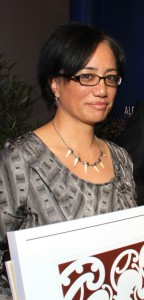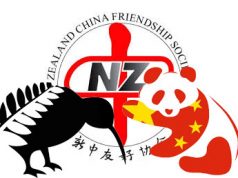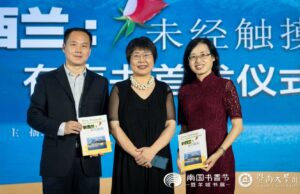NEXT BRANCH MEETING
Wednesday, 15 May 2013, at 5.45 pm
The Maori Feather Cloak Presented to Chairman Mao
Awhina Tamarapa (Ngāti Kahungunu, Ngāti Ruanui, Ngāti Pikiao) is curator, Māori at Te Papa. She holds a Bachelor of Māori Laws and Philosophy from Te Wānanga o Raukawa, Otaki, and a Bachelor of Arts from Victoria University, Wellington, where she majored in Anthropology. She has worked in museums for more than 20 years, including as concept developer and collection manager at Te Papa, and has contributed to various publications including Ngā Puna Roimata o Te Arawa (National Museum, 1993), Curatorship: indigenous perspectives in post-colonial societies: proceedings (Canadian Museum of Civilisation, Ottawa, 1996), the Te Papa Press books Icons Ngā Taonga (2003), Taiāwhio: Conversations with Contemporary Māori Artists (2002), Taiāwhio II: Contemporary Māori Artists; 18 New Conversations (2007), and Looking Flash: Histories of Clothing in New Zealand, which was published by Auckland University Press in 2007.
Awhina will talk about the Chairman Mao Māori feather cloak, its connection to the NZCFS and the significance of the cloak as a symbol of friendship between China and NZ today. She’ll also talk about Te Papa’s involvement since last year with the National Museum of China, the sharing of information and proud display at the NMC, and the successful bid to borrow the cloak for research and display at Te Papa from June to October. It is also an opportunity to talk about her experience at the National Museum of China as part of a staff exchange, and to acknowledge the partnership of the NZCFS in enabling hugely important projects to happen.
Connolly Hall, Guildford Terrace, off Hill Street, Thorndon, Wellington (see map)
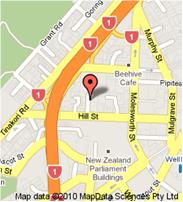
(Car park up Guildford Tce beside Hall)
An optional Chinese buffet meal, supplied by the Fujiyama Café, will follow the meeting at 7 pm. Orders for the $11.00 meal (please pay at the door) will be taken up till 6 pm. If you think you may be arriving late, please let the Secretary know in advance.
ALSO COMING UP THIS MONTH (see below for details)
11 May, 10am ‘Chinese Bridge’ Competition, Wellington East Girls’ College
11, 18, 25 May Mandarin Corner, 20 Kelburn Parade
24-26 May NZCFS Conference, Canterbury University, Ilam, Christchurch
IDIOM OF THE MONTH (from Ellen Yang)
高山流水 gāo shān liú shuǐ
lofty mountains and flowing water, referring to understanding and appreciative friends
NEW MEMBERS – a warm welcome to Jane Kitchenman and Ruiping Ye & Shuguang Huang
REPORT ON LAST MEETING (from Ray Brownrigg)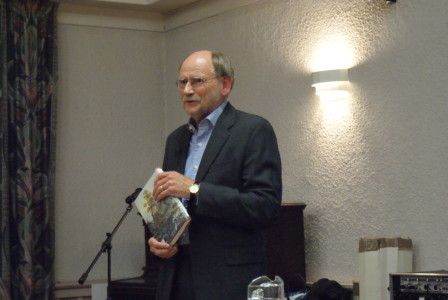
A very good number of members and visitors braved the somewhat inclement “breaking the drought” weather on Wednesday 17th April to hear Chris Elder, former Ambassador to China, speak about the book he has edited to mark the 40th anniversary of the establishment of diplomatic relations between New Zealand and China in December 1972. Standing in for our new President Michael Powles, who had a previous commitment, our newly co-opted Vice-President Christine Strickland opened the meeting with some housekeeping items then, after a brief description of some of the history leading up to the subject of the next meeting, introduced our guest speaker.
The book, titled New Zealand’s China Experience, “collects fiction, poetry, personal accounts, historical episodes, anecdotes, transcribed oral narratives, newspaper articles and more, all bearing in one way or another on New Zealand perceptions of China and contacts with China and the Chinese.” Mr Elder covered 3 aspects of the book, namely the genesis of the publication, the content itself and the specific links to the NZ China Friendship Society. On the genesis, he described the process by which the idea for such a book was developed within MFAT, with himself being targeted as the editor early on in the process. The book was intended to be based loosely on the preceding 30th Anniversary publication, which was essentially a collection of lectures, but was intended to be understandable by a wider audience, in the interests of educating New Zealanders in particular about the relationship between the two countries. Once an interested publisher was found in Victoria University Press, the process of research and selection could begin.
Describing the content, Mr Elder singled out a few early names such as Alexander Don – a missionary who kept a very detailed journal of immigrant gold miners’ names and origins, James Ng and Rewi Alley, who appeared very frequently in reference, if not as an author. During the collection process, it became clear to him that many of the names, even some as important as Rewi Alley, were not widely known by the current younger generations and he realised that some editorial notes were required to make the content accessible to such readers. He also described how he came by some of the extraordinary photographs adorning the book, and how there could have been many more if the budget had been unlimited or, in one case, if their value had been recognized and they had been better preserved.
Finally on the subject of links to NZCFS, Mr Elder pointed out how many of the contributors were or are members of the NZCFS, particularly in the years before the establishment of diplomatic relations, characterizing the Society as “what kept the flame alive”. He commented that there is still a struggle to create a broad base of awareness of what New Zealand’s relationship to China has to offer.
After the meal Mr Elder graciously signed more than a dozen copies of the book which had been made available for sale at the meeting. [See elsewhere in this newsletter how you can obtain a discounted copy of the book.]
POWHIRI FOR MAO’S MAORI CLOAK – 23 April 2013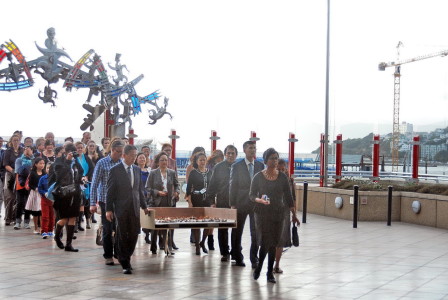
Wellington Branch and National Executive members attended the formal welcome of Chairman Mao’s cloak held at the Te Papa marae. It was a very significant and moving occasion that marked a circular journey of nearly 56 years since the cloak’s presentation to Chairman Mao by Ramai Hayward during an NZCFS tour … read the full report on our website nzchinasociety.org.nz/13191/powhiri-for-the-chairman-mao-feather-cloak/
Wellington Branch then hosted Mr Chen and Mr Tan, curators from the National Museum of China (NMC) who accompanied the cloak to NZ, to lunch at the Dragons Restaurant. We were glad that National President Eric Livingstone was able to join us.
NZCFS has formed a partnership collaboration with Te Papa in their cooperation project with the National Museum of China to borrow the historic Chairman Mao cloak for research and display in Te Papa from June to October 2013.
MEETING DATES FOR 2013
Your committee has organised the following meeting dates for 2013. Please mark these dates in your diary:
Sun 23 June, Sun 21 July, Wed 21 August, Wed 18 September, Wed 16 October, Wed 20 November. Note that the June meeting is on the 4th Sunday in June (rather than the 3rd Sunday).
NEW COMMITTEE MEMBERS We are pleased to announce the co-option of Annette Meates and Graham Gibbs to the Wellington Branch Committee.
MEMBERS’ DISCOUNT AVAILABLE FOR CHRIS ELDER’S BOOK
To qualify for the 20% discount for New Zealand’s China Experience as a member of NZCFS, please go to the Victoria University Press website vup.victoria.ac.nz/recent-books/, add the book to your cart and enter the coupon code “NZChina” (case sensitive). Postage is additional, but free within New Zealand
NZ TRADE & ENTERPRISE BUSINESS TRAINING
NZ Trade & Enterprise will be conducting China Business Training in Wellington from 4-7 June. The training is designed to help New Zealand businesses and business people to:
• Understand the market, and how the government and business in China operates
• Navigate language barriers, cultural difference and regional variations
• Build and maintain business relationships
• Work within the Chinese legal, financial and management structures
China Business Training is delivered in a four day programme consisting of eight half day modules which can be completed together, or individually. Training is primarily funded by NZTE, so will only cost you NZ$50 per person, per day. For more information, see www.nzte.govt.nz/chinabusinesstraining.
WEA WORKSHOP – CHINA TODAY
The Wellington Workers Educational Association is organising, with the support of the Confucius Institute, a half-day workshop on “China – the Chinese and You”, at the Loaves and Fishes Hall on 25 May from 1:30-4:30pm. The cost is just $20. See wellingtonwea.org.nz/?page_id=455 for further details and to register.
CONFUCIUS INSTITUTE NEWS (from the CIVUW team)
The ‘Chinese Bridge’ Chinese Proficiency Competition (汉语桥) has become a highlight on the Confucius Institute events calendar. The Wellington regional competition for tertiary and year 7 – 13 students will be held on Saturday 11 May 2013 at Wellington East Girls’ College. First Prize Winners of this regional competition will be offered a complimentary return ticket to attend the National Competition in Auckland where they will compete for a place in the International Final in China! Register before 6 May 2013 by email to [email protected]. Read more: www.victoria.ac.nz/ci/news-and-events/events/wellington-regional-chinese-bridge-chinese-proficiency-competition
CHINA NEWS May 2013 (by Joy Bickley Asher)
In 2012 Victoria University Press published New Zealand’s China Experience, edited by Chris Elder. This was the subject of Mr Elder’s talk at the April meeting of the branch. The book is a treasure trove for all those who are interested in the relationship between New Zealand and China. One chapter, called ‘The way to Yenan’, details Kiwi James Bertram’s meeting with Mao Tse-Tung in 1937. Mr Bertram was working as a journalist for a UK publication at the time and the chapter is from Mr Bertram’s memoirs. Here are some excerpts.
A tall, slightly stooping figure rose and extended a hand: I looked into shrewdly puckered eyes, under the brim of a faded cloth cap…
Mao Tse-Tung in the autumn of 1937, though no longer gaunt, still showed signs of the privations of the Long March. With his long hair parted in the centre and hanging down over his ears, his gentle quizzical manner, and his unbuttoned tunic, he looked more like an absentminded scholar than a military or political commander…
When he stood up to address the cadets… Mao talked easily in his thick Hunan accent, with a lively play of peasant humour and bawdry – often his audience was swept with gales of laughter as he made an unexpected crack. ‘Our task,’ he told the cadets, ‘is to find out in practice the weaknesses of the Japanese army. Then if we are resourceful and determined, we shall be able to destroy it piece by piece…’
We must make the Eighth Route Army into a model army: both by our fighting and by our work among the common people…
Remember the last Will of Dr Sun Yatsen – that the Chinese revolution has not yet been completed, because all the people have not yet been roused. Our task is to rouse them because we are the People’s Revolutionary Army.
Mr Bertram goes on to comment; ‘Simple points in homely language; a few jokes to clear the air, then the main points over again: That was Mao’s public style, and it certainly worked’.
MANDARIN CORNER 汉语角 3.15pm – 4.30pm Saturdays during school terms
Seminar Room, 20 Kelburn Parade, Victoria University of Wellington.
Open to all ages, all levels. One to one, or small groups.
Gold coin donation. 3 sessions in May 2013:
11 May – Chinese Cuisine – Sticky Rice Dumpling Making and Tasting 中华美食系列 – 粽子
18 May – Katherine Mansfield and Xu Zhimo Once Met 凯瑟琳•曼斯菲尔德与徐志摩的一面之缘
25 May – A Random Talk About Chinese Snacks 漫谈中华小吃
Contact: Ellen Yang (04) 473-7558, [email protected]
ZONGZI WORKSHOP AT MANDARIN CORNER 粽子讲习班
Saturday 11 May 2013, 3:15 – 5pm Seminar Room, 20 Kelburn Parade, Victoria University of Wellington
Demonstrator: Mr Shenghua Zhang Learn how to make Zongzi 粽子 in a friendly environment. A chance to taste delicious, healthy Zongzi! Booking is essential due to expected demand. For registration by 10 May, please contact: Ellen Yang, [email protected], (04) 4737558.
CHINESE FILM 中国电影
Date: Thursday 23 May Time: 7.15pm
Venue: Committee Room One, Wellington City Council, 101 Wakefield Street. Gold coin donation.
7.15pm: Lost on Journey, 人在囧途 [2010] 95 minutes
Director:叶伟民Wan Man Yip Starring: 徐峥Xu Zheng,王宝强Wang Baoqiang,李小璐Li Xiaolu
With a small budget, this movie made a surprise hit at China’s box office. Good chemistry between the two leads makes for an enjoyable, odd-couple road movie. A boss of a toy corporation, Chenggong Li, tries to head back to celebrate the Chinese New Year with his family. However, plans don’t go as smoothly after he crosses paths with a stranger, Geng Niu.
Film sponsored by Cultural Section, Chinese Embassy in NZ 感谢中国驻新西兰使馆文化处提供影片
SUSPENDED WOODEN HOUSES OF THE MIAO MINORITY (from George Mills)
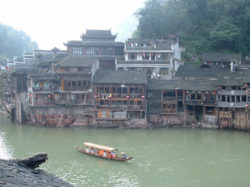 Suspended wooden houses are a typical building in Miao villages. These wooden houses are built on stilts a few meters above the ground along the mountain ridge. Xijiang, a Miao village of about 1,000 people, is located at the foot of the Leigong Mountains along the Bai River in Leishan County in south western Guizhou Province. The wooden houses in the area are usually built on a 30-70 degree mountain slope, all made of wood, without any nails or rivets. The wooden beams and pillars are connected using tenons and mortises. Normally, the suspended houses are three-story buildings with three to five rooms each. They are scattered along the mountain ridges, suspended on wooden stilts, and form the most typical look of a Miao village. The suspended wooden houses in Xijiang are built using construction techniques that are around 7,000 years old. With countless changes and innovations to the houses during the course of their development, they are now simple to build, solid and moisture-proof and they help save farming land. These building styles represent the special culture of the Miao people, and also provide valuable information for the study of the evolution of the Miao. That said, few young people like to live in the suspended wooden houses, and even fewer are willing to learn the techniques of building these houses. There are also very strict requirements that govern the building of such houses in terms of materials used, location, fire safety, and dangers posed by possible landslides. (cultural-china.com, edited.)
Suspended wooden houses are a typical building in Miao villages. These wooden houses are built on stilts a few meters above the ground along the mountain ridge. Xijiang, a Miao village of about 1,000 people, is located at the foot of the Leigong Mountains along the Bai River in Leishan County in south western Guizhou Province. The wooden houses in the area are usually built on a 30-70 degree mountain slope, all made of wood, without any nails or rivets. The wooden beams and pillars are connected using tenons and mortises. Normally, the suspended houses are three-story buildings with three to five rooms each. They are scattered along the mountain ridges, suspended on wooden stilts, and form the most typical look of a Miao village. The suspended wooden houses in Xijiang are built using construction techniques that are around 7,000 years old. With countless changes and innovations to the houses during the course of their development, they are now simple to build, solid and moisture-proof and they help save farming land. These building styles represent the special culture of the Miao people, and also provide valuable information for the study of the evolution of the Miao. That said, few young people like to live in the suspended wooden houses, and even fewer are willing to learn the techniques of building these houses. There are also very strict requirements that govern the building of such houses in terms of materials used, location, fire safety, and dangers posed by possible landslides. (cultural-china.com, edited.)
NO MORE ENVIRONMENTAL FREEBIES (by Luke Qin 秦瞳)
Long gone are the days that local government officials would seek to bury crises in the hope of saving their jobs by not alerting their superiors and in doing so, keeping the public in the dark, would have justifiably performed their overriding duty of maintaining social stability. These days it literally would not pass the smell test, for anyone needing to breathe in Beijing when the smog hit, for example, let alone escape the prying eyes of netizens who have successfully helped expose a number of high profile cases by poring over anything and everything.
It appears that losing face is no longer everyone’s biggest concern when it comes to exposing the underbellies of an economy that has grown exponentially in the last 20 years, but was more often than not at the detriment of the environment, that has suffered beyond imagination in some places in pursuit of the all-important GDP growth.
One should remain confident that now with “reform regardless of how deep the water is” and 正能量, a direct translation of “positive energy”, becoming the catch phrases in mainstream Chinese media, Beijingers who still decide to light up after what they have gone through lately will always have to buy their own smoke, and Shanghainese who have recently had to do a stock take along the riverbank will always have to cook their own pork soup before long.


